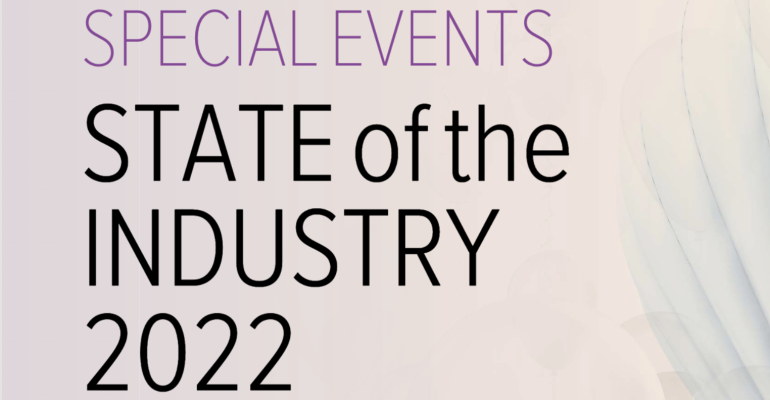MENTAL HEALTH OF PLANNERS
According to Charessa Sawyer, LMSW and founder of the Event Therapy Network, the pandemic pulled back the curtain on the state of mental health in the industry, and what we’re seeing is a desperate need for mental health resources and planners who prioritize their own wellbeing. While many wellness conversations were percolating before the pandemic, it was the pause in the industry that catapulted these topics into a new reality. With job losses and financial scares, the frailty of mental health became clear across the industry, making work-life balance and personal health a priority.
Among her clients, Sawyer sees that the stress of professional issues stems from personal problems—childhood trauma and Post Traumatic Stress Disorder, for instance. These unaddressed issues are aggravated by the perfectionism and high-stress environment of the events industry, often showing up as anxiety, eating disorders, substance abuse, and depression, among other issues.
Sawyer and several other industry experts discussed the topic of mental health in the events industry during a Candid Conversations panel at The Special Event 2022 (to be continued at TSE 2023). During this panel, which visibly moved attendees, speakers discussed the perfectionism, competition, isolation, imposter syndrome, and self-criticism that planners easily fall into. There were recurring themes of the importance of planners seeing each other as confidants instead of competition; of finding people to be vulnerable with and purging the industry of impossible expectations.
Between social media and professional displays of success, perfectionism has a stronghold. “Stop trying to keep up, social media will definitely have you doing back flips,” says Sawyer. The collective discussion is centered on the importance of planners being honest with themselves and their clients about what they can achieve. As Terrica, owner of Cocktails and Details, said in the discussion panel, “Planners keep telling clients, ‘You can have the wedding of your dreams.’ No, the hell you can’t!”
Many planners are now recognizing that the human need for validation is easy to find in the events industry, but internal validation is one of the keys to mental health. Sawyer says that self-awareness is the first step to making any changes. By continuing these conversations, becoming aware of the industry’s effect on mental health and learning to check in with emotions and personal traumas, event planners can begin the healing process and lead the events industry in a healthier direction. This awareness can be utilized in a moment of stress or anger by pausing and using positive self-talk to deal with an emotional obstacle, instead of perpetuating what Sawyer calls “event warfare”—the miscommunication among colleagues that leads to emotional pains and fractured business relationships.
The panel also discussed the need to celebrate personal achievements, instead of focusing on turning growth opportunities into self-criticism. There is increasing recognition that uplifting oneself and each other is important for creating a healthier feedback system and improving mental health in the industry.
Other conversations are changing the way planners think about roles in relation to other professionals. The closing keynote speaker for The Special Event 2022, chef Roy Choi, emphasized the idea of collaboration across fields; between front of house and back of house, between caterers and planners, even between planners and their team. Delegating tasks and creating a team mindset is an important step forward for decreasing stress and improving mental health.
The consensus among thought leaders is that prioritizing mental health is the only way to make the event profession a sustainable career. Making time for mental health is a personal choice, but it’s also necessary; many planners are now understanding the connection between personal and professional, leading to the creation of event therapy resources, support groups, and more awareness for setting boundaries and creating time for mental health. When doing timelines and event strategies, Sawyer says, “you have to pencil yourself in...You have to make sure every day your name is written in the calendar.”
As we slip back into “normal” pre-pandemic numbers and routines, it’s vital to be proactive against pre-pandemic mental neglect, and it’s important to keep the discussion going. With rising event numbers stacked against staffing shortages, planners are at high risk for burnout and mental illness, but by valuing their health equally or more than business, they can ensure wellness enough to keep a business thriving. As Sawyer put it, “If you don’t prioritize your health, your body will.” Taking time to care for ourselves is the key to maintaining healthy personal lives and healthy careers.
One other thing to keep in mind going forward: transparency on the topic. Honest conversations are how we can destigmatize mental illness. It’s easy for most people to admit to anxiety, because this illness has been destigmatized. Substance abuse—not so much. Alcohol and other consumable vices are easily accessible, even encouraged, at events. The best thing planners can do right now is to commit to self-awareness and to find solidarity in their community, seeing each other as confidants, not competitors. Being “open and honest,” as Sawyer put it, is the key to breaking down barriers and creating a healthier future for events.
Stay tuned for the rest of our State of the Industry 2022!
To view part 2, click here.
Catch Charessa at Catersource + The Special Event this March in Orlando for her sessions:
Discovering Mental Health: Why Event Professionals Should Consider Therapy, a panel with event therapist Sierra Reed and event assistant Shaunelle Murphy
Event Therapy Lounge: Meditation & Self Care Session for Event Professionals, with event therapist Sierra Reed





